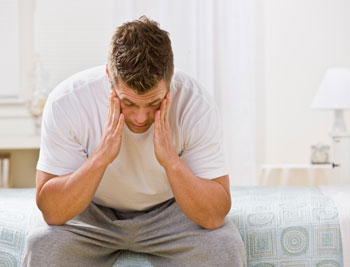 Bedwetting, or nocturnal enuresis, refers to urinating while asleep. Bedwetting in children is normal, but adult bed wetting may not only be embarrassing but may also indicate an underlying medical issue. The National Association for Continence, or NAFC, reports that approximately 2% of adults experience bedwetting.
Bedwetting, or nocturnal enuresis, refers to urinating while asleep. Bedwetting in children is normal, but adult bed wetting may not only be embarrassing but may also indicate an underlying medical issue. The National Association for Continence, or NAFC, reports that approximately 2% of adults experience bedwetting.
Is Bedwetting in Adults a Concern?
Bedwetting in adults can be caused by a hormonal imbalance involving the hormone known as ADH, or antidiuretic hormone. ADH is responsible for letting your body know that it should decrease its urine production while sleeping, which allows you to hold this smaller amount of urine for several hours overnight. If your body does not make enough ADH, your bladder may not be able to hold the larger amount of urine being stored, resulting in bedwetting.
It is important to get examined by a doctor if bedwetting begins during adulthood. Adult bed wetting is not common and could be caused by a number of reasons, including obstructive sleep apnea, neurological disorders, enlargement of the prostate, or even cancer of the prostate or bladder. Other reasons for this are outlined below.
- Diabetes can be an underlying cause of bed wetting in adults. Since people with this illness are unable to process sugar normally, excess amounts of urine may be produced, which may lead to adult bedwetting.
- Diuretic medications are prescribed as treatment for some heart conditions and for high blood pressure. They also cause more urine to be produced and stored in the bladder, which can cause bedwetting if they are taken at night. Try taking these medications during the day instead.
- Alcohol and coffee also cause additional urine production and should not be consumed later than 3 hours before going to bed.
- If you take sleeping pills, you may not wake up when you need to urinate, which can cause bedwetting. Talk to your doctor about your dosage and whether you require this medication.
- Bladder issues, such as a urinary tract infection, or UTI, can cause bedwetting in adults.
- Anxiety and stress can also cause bedwetting, which may continue even after overcoming the stressful situation.
- There is also evidence that adult bed wetting may run in the family.
What to Do with Adult Bedwetting?
Although it may feel embarrassing to discuss bedwetting as an adult, it is important to speak to your doctor or a continence advisor.
During your visit, your medical professional will ask about your bladder routine, so you may want to keep a log for a few days before your conversation. Try recording how much you drink, how often you urinate, and how often bedwetting occurs. Your doctor may request a sample in order to test for a urinary tract infection. Other tests may also be ordered, such as a bladder, or urodynamic, test.
What to Do By Yourself?
Being a bedwetting adult is embarrassing, but here are a number of changes that you can make to your lifestyle that may help stop adult bedding as outlined below.
|
What to Do |
Description |
|
Control liquid intake |
A key area to focus on when trying to control adult bed wetting is to set a limit on the amount of liquid consumed. Reduce or avoid the amount of fluids you take in during the last few hours before going to bed. Instead, do most of your drinking of liquids prior to or at dinner. This way, your body will have taken in what fluids it requires, and your bladder will not be holding much urine when you go to bed for the night. |
|
Avoid alcohol or caffeine |
Avoid drinking alcohol or caffeine during the evening hours, as these types of liquids tend to irritate your bladder and cause you to need to urinate more often. Some people also find that other carbonated drinks may cause bladder irritation and increased urinary frequency. |
|
Choose wisely |
If you are already experiencing bedwetting, drinking alcoholic beverages will make it worse. This may be due to the effect of alcohol on the body or the increased amount of fluid. If you choose to drink alcoholic drinks, try those with lower alcohol content. |
|
Keep a journal |
It is a good idea to create a urination timetable where you schedule times to remind you to empty your bladder, for example: every 1-2 hours. As well, be sure to urinate just before bed to lower the likelihood of bedwetting. |
|
Choose bedding and mattress with care |
In order to protect your bedding and mattress, try covering them with a waterproof fabric. These are much more comfortable than using plastic. Try avoiding nightclothes that are made with nylon material, as this is an absorbent material and can make you uncomfortable. There are also bottom bed sheets that are made from cotton and are easily washed and absorbent to keep you comfortable in case of an accident. If you happen to be away from home, you can try disposable under pads or sheets. These are also available at some hotels. |
